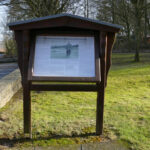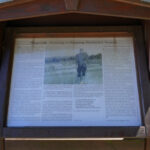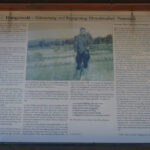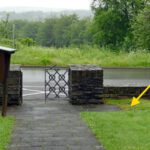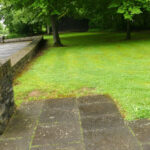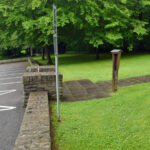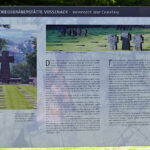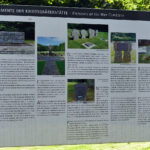“Modern culture of remembrance” in the District of Düren: Volksbund Deutsche Kriegsgräberfürsorge NRW on the removal of the information board on Julius Erasmus from the Vossenack military cemetery in 2021 (Published on 17/06/2022, updated on 21/06/2022)
Last fall it had already been reported here in a post that in June 2021 the information board on Julius Erasmus, previously located in the entrance area of the military cemetery Vossenack, had abruptly disappeared.
Since then, the District of Düren under District Administrator Spelthahn undertakes the most abstruse contortions in order to avoid having to disclose more detailed information about the removal of the board. They insist to “not (anymore)” know the exact date of the removal. Allegedly, the initiation of the removal and the date of its execution have not been documented at any place of the administration of the District of Düren, in particular not at the responsible department “Zentrales Gebäudemanagement” (“Central Facility Management”) and also not at the responsible cemetery caretaker, who should have carried out the removal. It remains to be seen whether these statements will ultimately prove to be tenable.
The subject of this article is to be the handling of the matter by the Essen-based North Rhine-Westphalia state association of Volksbund Deutsche Kriegsgräberfürsorge e.V. (“Volksbund NRW”), the German War Graves Commission. Since the beginning of my research on Julius Erasmus, I have had repeated contact with Volksbund NRW and its Managing Director Stefan Schmidt, several times also personally on site. The experiences I have had so far with Volksbund in the course of my research deserve their own consideration. It may not remain unmentioned here, however, that I was repeatedly signaled from Volksbund that my research was met with skepticism. The statement was made that this was considered a “heroic commemoration” („Heldengedenken“), of which they did not think much.
1. Flashback: First Inquiry to Volksbund NRW in summer 2021
A first inquiry in July 2021 to the Managing Director of Volksbund NRW, Stefan Schmidt, about the whereabouts of the information board had produced little fruitful results. It was essentially indicated that the removal of the board had “already been decided a long time ago” and that it had been “considered superfluous”. Mr Schmidt did not want to give more details about who had decided this and when. However, the District of Düren had stated that the removal of the board had taken place “in consultation with the regional office of Volksbund NRW”.
2. Renewed request to Volksbund NRW in in December 2021
On 17/12/2021, I therefore contacted the State Chairman and Head of the Volksbund state office for Northrhine Westfalia, Thomas Kutschaty. Those noting this name with astonishment should be told that it is in fact the politician Kutschaty of the Social Democratic Party (“SPD”). What relation he has to war graves and what qualifies him for the function as Volksbund State Chairman are undoubtedly legitimate questions, which, however, will also not be addressed here.
In my letter, I asked Mr Kutschaty to answer the following questions:
(1) When was the removal of the information board decided and by whom?
(2) What agreement(s) did Volksbund NRW reach with the District of Düren as regards the removal of the information board and when did this take place (in each case)?
3. The response of Volksbund NRW in February 2022
For the answer, Mr Kutschaty again sent the Volksbund State Managing Director Schmidt, who released a letter on the removal of the information board at the beginning of February 2022, about two months after my inquiry. It is not surprising that the questions asked were once again not answered.
Mr Schmidt first emphasized that Volksbund was essentially only responsible for German war graves abroad, while those in Germany, such as those at the military cemetery in Vossenack, are the responsibility of the cities and municipalities. This Volksbund automatism can be observed again and again. In essence, they apparently want to convey not to be responsible due to not being in charge. One would wish Volksbund to also refer to its limited responsibility when it comes to appeals for donations. Here I have never noticed such a reference, why is that?
a) From a “legend board” to honor the “old captain of the engineer forces Erasmus” to an “information board about the military cemetery”
It is admitted that the information board was erected in 2005 as part of project “legend board” (“Legendentafel”) by the District of Düren at the suggestion of Volksbund NRW and explains the alleged nature of the board – in astonishing consistency with the District of Düren – as follows (translation from German):
“This board was an information board about the Vossenack war cemetery, but not, as you designate, an information board about Julius Erasmus.”
District Administrator Spelthahn had previously explained why it was not a “commemorative board for Julius Erasmus”, “but a general information plaque about the Vossenack war cemetery” (translations from German).
If Mr Spelthahn was indeed unaware of the history of the board, this would not be surprising, at least here, after all previous experiences with him and his administration. However, Mr Schmidt as the Managing Director of Volksbund NRW should certainly know it better, he would only have to have a look in his own files. There, it is easy to see that the board, originally indeed intended primarily to provide information about the military cemetery, was apparently revised in 2002 as part of the “legends board” project and specifically supplemented with a section on Julius Erasmus and his activities. According to the person in charge at Volksbund NRW at that time, this was done expressly with the intention of paying tribute to “the old captain of the engineer forces” and his achievements and “to make him unforgettable” (translations from German). In a letter from 20/01/2003, for instance, it is stated (translation from German):
“there are a large number of war grave sites in Germany and abroad, the history of which is inextricably linked to the tireless commitment of individuals; (…)
These people and their commendable work are not forgotten; they are honored in the information about the respective war grave sites. In NRW this happened and happens mainly in the ‘Project Legend Board’. Thus, when redesigning the text for Vossenack, I naturally wanted to single out the old captain of the engineer forces Erasmus with his achievement and thus make him unforgettable.
Against this background, we consider a memorial board for Erasmus, which would find a place somewhere in the cemetery – without grave reference – to be dispensable. The visitors in Vossenack read the text of the information board and are made attentive. As an appreciation, this seems more effective to us.”
The express wish of the then responsible person at Volksbund NRW to honor Julius Erasmus is expressed in several places of the file, which I was able to study. Objections against these plans are at least not contained in this file.
Now one may think differently about this at Volksbund NRW today, this happens. However, to act as if said board was never intended to commemorate Julius Erasmus and his actions is dishonest and does not cast a good light on Volksbund NRW. Apparently, even in their own history it is not allowed to exist what is not opportune (today). Opinions may be divided as to whether these are good conditions for an institution entrusted with caring for historically significant sites such as military cemeteries.
b) The information board on Julius Erasmus as a “dispensable duplication of information”?
In his letter, Mr Schmidt further refers – also in this respect again closely aligned with the previous statements of the District of Düren – to the new boards erected in 2015. Julius Erasmus is said to be honored on two of them, the “older” board was therefore considered dispensable. He states (translation from German):
“In order to avoid a duplication of information and the designation ‘Ehrenfriedhof’ (“cemetery of honor”) used on the older board, the District of Düren removed this older board at the cemetery gate some time ago. This happened belatedly and should have been done already in the course of the creation of the new board.
This process is altogether the updating of an information medium. It is the result of a discussion process around the ‘Windhund Memorial’, in which numerous local resident associations, groups and actors were (and are) involved, apart from the District of Düren, the Municipality of Hürtgenwald and Volksbund. According to the administrative regulation on the Graves Act, Volksbund has been heard by the body responsible for the cemetery and has given its consent.”
The fact that the said “new boards” describe the activities of Julius Erasmus at most casually, very superficially and, according to the findings here, factually incorrect, so that the alleged “duplication of information” already does not exist, has already been mentioned elsewhere.
Further, the Municipality of Hürtgenwald appears not to have been involved at least in the removal of the information board – in any case, it had answered to the corresponding inquiry from the beginning of July 2021 that it had no respective information.
4. Evaluation
The fact that Volksbund NRW needed about two months to answer two simple questions (and failed nonetheless) is probably also due to close coordination with the protagonists at the District of Düren in order to now avoid the discrepancies that could still be observed previously in the respective statements.
The whole incident reeks to high heaven. If one really considers the removal of the information board to be unproblematic and legitimate, one wonders why the District of Düren has carried it out secretly, silently and quietly and to this day convulsively clings to the downright ridiculous claim to “not (anymore)” know the exact date of the removal. It is worth reminding that when asked the question
“When was the public informed about the removal? If not: Why not?“
District Administrator Spelthahn answered (translations from German)
“No information about the removal has been provided; there was neither an obligation nor a necessity to do so.“
Such transparency deficits are often an unmistakable sign of legally questionable activities. One cannot help feeling that the District of Düren and Volksbund NRW are up to no good when it comes to commemorating the Second World War and its victims.
These activities will continue to be followed with interest and comprehensively documented.
(Head picture: German military cemetery Vossenack, summer 2021)
Further articles on the topic “‘Modern culture of remembrance’ in the District of Düren”:
- The removal of the information board on Julius Erasmus from the Vossenack military cemetery in 2021 (03/10/2021)
- News on the removal of the information board on Julius Erasmus from the Vossenack military cemetery in 2021 (23/08/2022)
- The “representative for the care of the war grave sites Vossenack and Hürtgen as places of a democratic culture of remembrance and commemoration” (“Beauftragter für die Betreuung der Kriegsgräberstätten Vossenack und Hürtgen als Orte einer demokratischen Erinnerungs- und Gedenkkultur”) (16/11/2022)
- The ban on laying flowers and candles at the military cemeteries in Hürtgen and Vossenack (12/02/2023)
- Administrative Court Aachen denies grant of a preliminary order against the District of Düren “flower ban”, appeal to the Higher Administrative Court (23/03/2023)
- Laying of wreaths by the Administrator of the District of Düren at the Military Cemeteries in Hürtgen and Vossenack on Remembrance Day 2022 – or: Quod licet iovi, non licet bovi? (21/04/2023)
- District of Düren denies “flower ban” on Military Cemeteries in Hürtgen Forest to press and media (13/05/2023)
- “Flower ban” of the District of Düren on the Military Cemeteries in Hürtgen Forest: Higher Administrative Court of the State of North Rhine-Westphalia rejects the appeal against the denial of urgent legal protection (03/07/2023)
- Administration out of control – District now also bans photos of the fallen in uniform at Military Cemeteries in Hürtgen Forest (18/08/2023)
- The “permanent exhibition” on the Hürtgen war cemetery (20/12/2023)
- The removal of the memorial stone for Julius Erasmus by the District in September 2022 (06/02/2024)
- The distortion of remembrance on the national Remembrance Day (“Volkstrauertag”) (21/04/2024)
- The “Dance Theater” over the graves of the war dead at the military cemetery in Vossenack on the occasion of Remembrance Day (“Volkstrauertag”) 2023 (19/08/2024)
- The statement of the President of Volksbund Deutsche Kriegsgräberfürsorge e. V. on the “Dance Theater” at the military cemetery in Vossenack on the occasion of Remembrance Day 2023 – a “fact check” (13/11/2024)
- Information from the District administration on “incidents with a right-wing extremist background” at the military cemeteries in Hürtgen and Vossenack and on “violations” of the cemetery rules (13/03/2025)
If you wish to support my work on Julius Erasmus, you can do so here. Many thanks!


